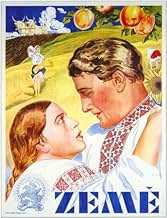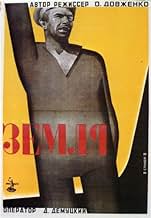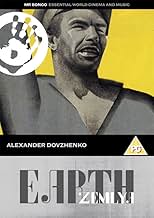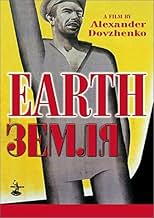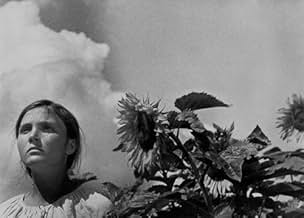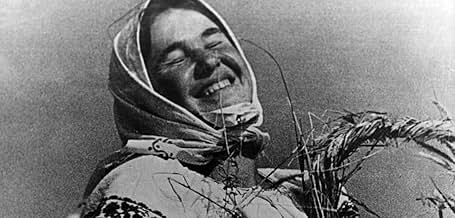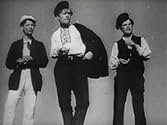IMDb RATING
7.2/10
6.8K
YOUR RATING
In the peaceful countryside, Vassily opposes the rich kulaks over the coming of collective farming.In the peaceful countryside, Vassily opposes the rich kulaks over the coming of collective farming.In the peaceful countryside, Vassily opposes the rich kulaks over the coming of collective farming.
- Director
- Writer
- Stars
- Awards
- 1 win & 1 nomination total
Stepan Shkurat
- Opanas
- (as S. Shkurat)
Semyon Svashenko
- Vasyl - son of Opanas
- (as S. Svashenko)
Yuliya Solntseva
- Daughter of Opanas
- (as Yu. Solntseva)
Yelena Maksimova
- Natalya - Vasyl's fiancee
- (as Ye. Maksimova)
Nikolai Nademsky
- Ded Semyon
- (as N. Nademsky)
Ivan Franko
- Kulak Belokon
- (as I. Franko)
Pyotr Masokha
- Khoma - son of kulak Belokon
- (as P. Masokha)
Vladimir Mikhaylov
- Priest
- (as V. Mikhaylov)
Pavel Petrik
- Young Party-Cell Leader
- (as P. Petrik)
P. Umanets
- Chairman of the Village Soviet
- (as Umanets)
Luka Lyashenko
- Young Kulak
- (as L. Lyashenko)
Vasiliy Krasenko
- Old Peter
- (uncredited)
M. Matsyutsia
- Farm Girl
- (uncredited)
- Director
- Writer
- All cast & crew
- Production, box office & more at IMDbPro
Featured reviews
Dovzhenko was a 'modernist' who drew deepest inspiration from traditional arts. His ode to the beginning of the collectivization is actually an orgy of intoxicant images of bulging clouds, waving wheat fields, ripening fruits and pelting horses.
The arrival of a tractor is hailed by the farmers. They begin to believe that an improved life has started, but Kulaks murder the young leader of the village party committee. This only encourages the village inhabitants in their resoluteness. In a sublime finale sequence, Dovzhenko unites birth, death, harvest, technical progress and solidarity, when the dead are returned to Earth that he loved so much.
No abstract summary can do justice to the extraordinary sensualism of this remarkable film. Whoever searches for the roots of Andrei Tarkovsky's cinema has to start with "Zemlya".
The arrival of a tractor is hailed by the farmers. They begin to believe that an improved life has started, but Kulaks murder the young leader of the village party committee. This only encourages the village inhabitants in their resoluteness. In a sublime finale sequence, Dovzhenko unites birth, death, harvest, technical progress and solidarity, when the dead are returned to Earth that he loved so much.
No abstract summary can do justice to the extraordinary sensualism of this remarkable film. Whoever searches for the roots of Andrei Tarkovsky's cinema has to start with "Zemlya".
Now I regret all the times I've railed about how propaganda is synonymous with contempt for the audience. It is sometimes hard to know what to say about a movie when it is a 'best of all time list' warhorse, but not this time. I have never - ever - seen a movie with a more deliberate, or surer, sense of rhythm. Two sequences that are nothing but long montages of fruit are absolutely riveting. A man sits, re-evaluating his world view, and because it takes a long time to do that we fade to black THREE times over about a minute, without him moving or changing position. This glacial tempo lulls us, so that Dovzhenko can jolt us with the arrival of a speedy tractor; or a collectivo's joyous dance through the dust over several lengthy wide shots is disrupted by his abrupt murder. Then the movie climaxes with an unbelievable crescendo where at least FIVE events are montaged, in perfectly comprehensible rhetorical construction. The movie begins with a death scene whose understated acting is mind-boggling even now, forget 1930; the final shot balances all the anti-church rhetoric with an image that is absolutely redemptive and spiritual, only the point is that redemption is found in LIFE. I'm not being pompous, this movie actually functions on that level. It achieves poetry AND propaganda in a way that I've never ever experienced before. It kind of reminds me of Brian Wilson's "Smile" in its modest grandeur, so true that it's painful, but so f***ing great that you want to experience it again and again. You can get it for free at the St. Catharines Library.
10Rigor
This great masterpiece of Soviet cinema has images so powerful and an editing technique so bold that at times the narrative is transcended. By this I mean that the film goes beyond it's original intention of arguing for changes from individualistic to more technologized and collective agricultural strategies and becomes a kind of realization of what a "liberated" agricultural zone would really look and feel like. This is a film ripe with the excitement of the creation of a new art to match a hopeful new world. It hardly needs to be mentioned that Stalinsit forces decried the final results of this masterpiece; calling it decadent and stylistically elitist. In actuality the film is too Marxist (I would go so far as to say too Leninist) for Stalinism. The film respects the ability of the viewer (and the viewers were assumed to be proletariat working class and agricultural workers) to grapple with rigorous ideas and images and to function outside of the narrative frame of individualistic melodrama. Like many early Soviet films this work seems not only ahead of its time, but, actually ahead of ours.
Stalin may have wanted an ode to collective agriculture; what he got instead was a hymnal to mother nature and the toiling offspring who dwell in her bosom. Those opening shots of pulsating fields waving in the wind have no equal for sheer evocative power. Earth is revealed at once as a living, breathing being and bountiful provider. Flower, fruit, decay, renewal -- nature's timeless cycle. The soundless imagery is at times so wonderfully lyrical that contemporary viewers may be led to recognize how much has been lost to the technology-driven cinema of today. Even the occasional plot crudities are rescued by a style that is both brilliant and unerringly pictorial. Close-ups of weather-worn peasants, a lone kulak and oxen beneath an immense sky, great rolling plains and far horizons of the Ukrainian breadbasket -- this is the sheer lyrical sweep of the Dovchenko masterpiece, a montage that transcends all obstacles, real and man-made. Not even the estimable John Ford frames primitive elements as grandly as this. There are flaws. Too many rushing crowd scenes appear without purpose, except to mimic Eisenstein's "march of history", while the propaganda thread at times blends uneasily with the lyrical. Still and all, Dovchenko pulls off the theme of new beginning more seamlessly than might be expected. Far from being a mere relic of the silent era, or an ode to Stalinist collectivism, Earth remains an enduring testament to the power of cinema as sheer visual poetry.
This is one of those "critics' darlings" titles that frequently crops up in "All-Time Best Films" polls; however, it is also one which certainly seems to have lost its edge with the passage of time. While I am generally a fan of politically-themed movies, I have always admired the early Russian classics for their pioneering use of film language but found them oppressively heavy-going viewing overall. This belated Silent is considered to be its director's masterwork and, despite the brevity of its running time (70 minutes), this standard opinion holds true regardless, notwithstanding the relative simplicity of its plot: tragedy strikes a farming community when oncoming progress (the use of a new tractor to plough the land in place of the old horse-driven method) divides it into two factions.
The intertitles on the copy I acquired (taken from the Kino DVD) are stiltedly Americanized and the acting style is typically hammy; what ultimately saves the film and preserves its reputation as a precious cinematic document are the strikingly lyrical compositions – highlighted by the extended funeral sequence of the murdered tractor driver which is powerfully intercut with the breakdown of the killer in a field, the lonely naked wife of the murdered man in the throes of sexual frenzy, a middle-aged villager going through labor pains, an elderly priest invoking a curse upon the godless community that has shunned him and an impromptu political rally by the mourners!
The intertitles on the copy I acquired (taken from the Kino DVD) are stiltedly Americanized and the acting style is typically hammy; what ultimately saves the film and preserves its reputation as a precious cinematic document are the strikingly lyrical compositions – highlighted by the extended funeral sequence of the murdered tractor driver which is powerfully intercut with the breakdown of the killer in a field, the lonely naked wife of the murdered man in the throes of sexual frenzy, a middle-aged villager going through labor pains, an elderly priest invoking a curse upon the godless community that has shunned him and an impromptu political rally by the mourners!
Did you know
- TriviaSoviet censors made Aleksandr Dovzhenko eliminate a number of scenes from the film, including the scene of peasants urinating into a tractor radiator, and the scene of nude woman mourning over her dead fiance. The original uncut version was screened in Ukrainian republic when first released, and then in the Museum of Modern Art (New York City, USA) about 40 years later, on 10 October 1969.
- Alternate versionsIn 1997, the film was re-released in Germany by ZDF, with a new score composed by Alexander Popov. This version was digitally improved (known as Arte Edition), then released on DVD and distributed by the absolut MEDIEN GmbH in 2006. The running time is 78 minutes. The crew participants:
- Alexander Popov, Composer;
- Frank Strobel, Conductor;
- Evgeniy Nikulskiy, Sound engineer;
- Nina Goslar, Commissioning editor.
- ConnectionsEdited into The Last Bolshevik (1993)
- How long is Earth?Powered by Alexa
Details
- Release date
- Country of origin
- Official sites
- Languages
- Also known as
- Soil
- Filming locations
- Production companies
- See more company credits at IMDbPro
- Runtime
- 1h 15m(75 min)
- Sound mix
- Aspect ratio
- 1.33 : 1
Contribute to this page
Suggest an edit or add missing content


